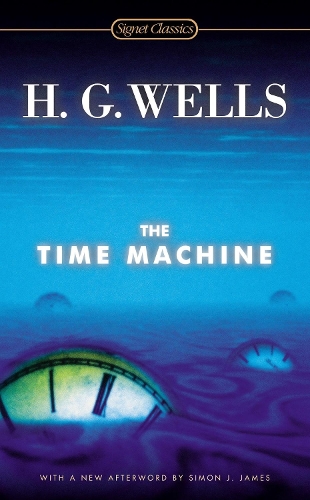
The Time Machine
(Paperback)
Available Formats
Paperback
Published: 20th April 2005
Paperback
Published: 16th July 2012
Paperback
Published: 1st July 1998
Paperback
Published: 7th June 1994
Paperback
Published: 15th July 2025
Paperback
Published: 2nd January 2015
Paperback
Published: 15th April 2017
Hardback
Published: 30th September 2020
Hardback
Published: 26th January 2017
Paperback, Media tie-in
Published: 2nd May 2002
Paperback
Published: 2nd March 2017
Paperback
Published: 10th December 2018
Paperback
Published: 15th January 2008
Hardback
Published: 29th November 2022
Paperback
Published: 1st August 2003
Paperback
Published: 12th April 1986
Paperback
Published: 29th August 2011
Publishing Details
The Time Machine
By (Author) H. G. Wells
Introduction by Greg Bear
Afterword by Simon James
Penguin Putnam Inc
Signet
2nd January 2015
United States
Classifications
General
Fiction
Adventure / action fiction
Science fiction: time travel / time slip
Romance
Science fiction: apocalyptic and post-apocalyptic
Classic fiction: literary and general
823.912
Physical Properties
Paperback
160
Width 105mm, Height 171mm, Spine 11mm
85g
Description
Published in 1895, this masterpiece of invention captivated readers on the threshold of a new century. Thanks to Wells's expert storytelling and provocative insight, The Time Machine will continue to enthrall readers for generations to come. 'I've had a most amazing time . . . ' So begins the Time Traveller's astonishing firsthand account of his journey eight hundred thousand years beyond his own era-and the story that launched H. G. Wells's successful career and earned him the reputation as the father of science fiction. With a speculative leap that still fires the imagination, Wells sends his brave explorer to face a future burdened with our greatest hopes...and our darkest fears. A pull of the Time Machine's lever propels him to the age of a slowly dying Earth. There he discovers two bizarre races-the ethereal Eloi and the subterranean Morlocks-who not only symbolize the duality of human nature, but offer a terrifying portrait of tomorrow as well. Published in 1895, this masterpiece of invention captivated readers on the threshold of a new century. Thanks to Wells's expert storytelling and provocative insight, The Time Machine will continue to enthrall readers for generations to come. With an Introduction by Greg Bear and a New Afterword by Simon J. James
Author Bio
H. G. Wells, the third son of a small shopkeeper, was born in Bromley in 1866. After two years' apprenticeship in a draper's shop, he became a pupil-teacher at Midhurst Grammar School and won a scholarship to study under T. H. Huxley at the Normal School of Science, South Kensington. He taught biology before becoming a professional writer and journalist. He wrote more than a hundred books, including novels, essays, histories and programmes for world regeneration. Wells, who rose from obscurity to world fame, had an emotionally and intellectually turbulent life. His prophetic imagination was first displayed in pioneering works of science fiction such as The Time Machine (1895), The Island of Doctor Moreau (1896), The Invisible Man (1897) and The War of the Worlds (1898). Later he became an apostle of socialism, science and progress, whose anticipations of a future world state include The Shape of Things to Come (1933). His controversial views on sexual equality and women's rights were expressed in the novels Ann Veronica (1909) and The New Machiavelli (1911). He was, in Bertrand Russell's words, 'an important liberator of thought and action'. Wells drew on his own early struggles in many of his best novels, including Love and Mr Lewisham (1900), Kipps (1905), Tono-Bungay (1909) and The History of Mr Polly (1910). His educational works, some written in collaboration, include The Outline of History (1920) and The Science of Life (1930). His Experiment in Autobiography (2 vols., 1934) reviews his world. He died in London in 1946.
